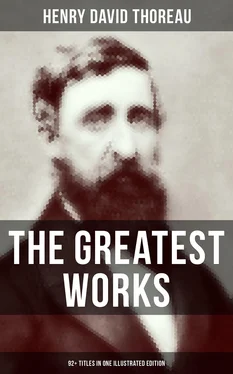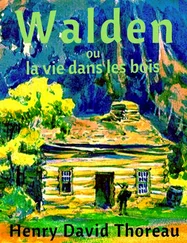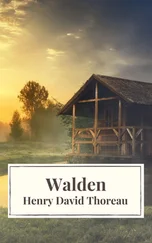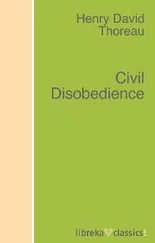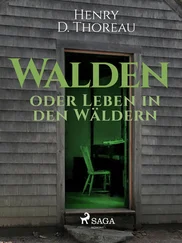In the morning I watched the geese from the door through the mist, sailing in the middle of the pond, fifty rods off, so large and tumultuous that Walden appeared like an artificial pond for their amusement. But when I stood on the shore they at once rose up with a great flapping of wings at the signal of their commander, and when they had got into rank circled about over my head, twenty-nine of them, and then steered straight to Canada, with a regular honk from the leader at intervals, trusting to break their fast in muddier pools. A “plump” of ducks rose at the same time and took the route to the north in the wake of their noisier cousins.
For a week I heard the circling, groping clangor of some solitary goose in the foggy mornings, seeking its companion, and still peopling the woods with the sound of a larger life than they could sustain. In April the pigeons were seen again flying express in small flocks, and in due time I heard the martins twittering over my clearing, though it had not seemed that the township contained so many that it could afford me any, and I fancied that they were peculiarly of the ancient race that dwelt in hollow trees ere white men came. In almost all climes the tortoise and the frog are among the precursors and heralds of this season, and birds fly with song and glancing plumage, and plants spring and bloom, and winds blow, to correct this slight oscillation of the poles and preserve the equilibrium of nature.
As every season seems best to us in its turn, so the coming in of spring is like the creation of Cosmos out of Chaos and the realization of the Golden Age. —
“Eurus ad Auroram Nabathaeaque regna recessit,
Persidaque, et radiis juga subdita matutinis.”
“The East–Wind withdrew to Aurora and the Nabathean kingdom,
And the Persian, and the ridges placed under the morning rays.
. . . . . . .
Man was born. Whether that Artificer of things,
The origin of a better world, made him from the divine seed;
Or the earth, being recent and lately sundered from the high
Ether, retained some seeds of cognate heaven.”
A single gentle rain makes the grass many shades greener. So our prospects brighten on the influx of better thoughts. We should be blessed if we lived in the present always, and took advantage of every accident that befell us, like the grass which confesses the influence of the slightest dew that falls on it; and did not spend our time in atoning for the neglect of past opportunities, which we call doing our duty. We loiter in winter while it is already spring. In a pleasant spring morning all men’s sins are forgiven. Such a day is a truce to vice. While such a sun holds out to burn, the vilest sinner may return. Through our own recovered innocence we discern the innocence of our neighbors. You may have known your neighbor yesterday for a thief, a drunkard, or a sensualist, and merely pitied or despised him, and despaired of the world; but the sun shines bright and warm this first spring morning, recreating the world, and you meet him at some serene work, and see how it is exhausted and debauched veins expand with still joy and bless the new day, feel the spring influence with the innocence of infancy, and all his faults are forgotten. There is not only an atmosphere of good will about him, but even a savor of holiness groping for expression, blindly and ineffectually perhaps, like a new-born instinct, and for a short hour the south hill-side echoes to no vulgar jest. You see some innocent fair shoots preparing to burst from his gnarled rind and try another year’s life, tender and fresh as the youngest plant. Even he has entered into the joy of his Lord. Why the jailer does not leave open his prison doors — why the judge does not dismis his case — why the preacher does not dismiss his congregation! It is because they do not obey the hint which God gives them, nor accept the pardon which he freely offers to all.
“A return to goodness produced each day in the tranquil and beneficent breath of the morning, causes that in respect to the love of virtue and the hatred of vice, one approaches a little the primitive nature of man, as the sprouts of the forest which has been felled. In like manner the evil which one does in the interval of a day prevents the germs of virtues which began to spring up again from developing themselves and destroys them.
“After the germs of virtue have thus been prevented many times from developing themselves, then the beneficent breath of evening does not suffice to preserve them. As soon as the breath of evening does not suffice longer to preserve them, then the nature of man does not differ much from that of the brute. Men seeing the nature of this man like that of the brute, think that he has never possessed the innate faculty of reason. Are those the true and natural sentiments of man?”
“The Golden Age was first created, which without any avenger
Spontaneously without law cherished fidelity and rectitude.
Punishment and fear were not; nor were threatening words read
On suspended brass; nor did the suppliant crowd fear
The words of their judge; but were safe without an avenger.
Not yet the pine felled on its mountains had descended
To the liquid waves that it might see a foreign world,
And mortals knew no shores but their own.
. . . . . . .
There was eternal spring, and placid zephyrs with warm
Blasts soothed the flowers born without seed.”
On the 29th of April, as I was fishing from the bank of the river near the Nine–Acre-Corner bridge, standing on the quaking grass and willow roots, where the muskrats lurk, I heard a singular rattling sound, somewhat like that of the sticks which boys play with their fingers, when, looking up, I observed a very slight and graceful hawk, like a nighthawk, alternately soaring like a ripple and tumbling a rod or two over and over, showing the under side of its wings, which gleamed like a satin ribbon in the sun, or like the pearly inside of a shell. This sight reminded me of falconry and what nobleness and poetry are associated with that sport. The Merlin it seemed to me it might be called: but I care not for its name. It was the most ethereal flight I had ever witnessed. It did not simply flutter like a butterfly, nor soar like the larger hawks, but it sported with proud reliance in the fields of air; mounting again and again with its strange chuckle, it repeated its free and beautiful fall, turning over and over like a kite, and then recovering from its lofty tumbling, as if it had never set its foot on terra firma. It appeared to have no companion in the universe — sporting there alone — and to need none but the morning and the ether with which it played. It was not lonely, but made all the earth lonely beneath it. Where was the parent which hatched it, its kindred, and its father in the heavens? The tenant of the air, it seemed related to the earth but by an egg hatched some time in the crevice of a crag; — or was its native nest made in the angle of a cloud, woven of the rainbow’s trimmings and the sunset sky, and lined with some soft midsummer haze caught up from earth? Its eyry now some cliffy cloud.
Beside this I got a rare mess of golden and silver and bright cupreous fishes, which looked like a string of jewels. Ah! I have penetrated to those meadows on the morning of many a first spring day, jumping from hummock to hummock, from willow root to willow root, when the wild river valley and the woods were bathed in so pure and bright a light as would have waked the dead, if they had been slumbering in their graves, as some suppose. There needs no stronger proof of immortality. All things must live in such a light. O Death, where was thy sting? O Grave, where was thy victory, then?
Our village life would stagnate if it were not for the unexplored forests and meadows which surround it. We need the tonic of wildness — to wade sometimes in marshes where the bittern and the meadow-hen lurk, and hear the booming of the snipe; to smell the whispering sedge where only some wilder and more solitary fowl builds her nest, and the mink crawls with its belly close to the ground. At the same time that we are earnest to explore and learn all things, we require that all things be mysterious and unexplorable, that land and sea be infinitely wild, unsurveyed and unfathomed by us because unfathomable. We can never have enough of nature. We must be refreshed by the sight of inexhaustible vigor, vast and titanic features, the sea-coast with its wrecks, the wilderness with its living and its decaying trees, the thunder-cloud, and the rain which lasts three weeks and produces freshets. We need to witness our own limits transgressed, and some life pasturing freely where we never wander. We are cheered when we observe the vulture feeding on the carrion which disgusts and disheartens us, and deriving health and strength from the repast. There was a dead horse in the hollow by the path to my house, which compelled me sometimes to go out of my way, especially in the night when the air was heavy, but the assurance it gave me of the strong appetite and inviolable health of Nature was my compensation for this. I love to see that Nature is so rife with life that myriads can be afforded to be sacrificed and suffered to prey on one another; that tender organizations can be so serenely squashed out of existence like pulp — tadpoles which herons gobble up, and tortoises and toads run over in the road; and that sometimes it has rained flesh and blood! With the liability to accident, we must see how little account is to be made of it. The impression made on a wise man is that of universal innocence. Poison is not poisonous after all, nor are any wounds fatal. Compassion is a very untenable ground. It must be expeditious. Its pleadings will not bear to be stereotyped.
Читать дальше
